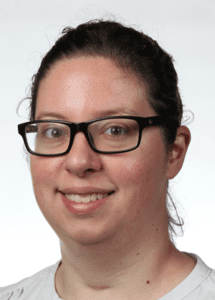Posted By: Alyson Barnes, PhD, Assistant Editor, AJHG
Each month, the editors of The American Journal of Human Genetics interview an author of a recently published paper. This month we check in with Christa (@ChrisprCas9) to discuss her recent paper “The methodological and ethical concerns of genetic studies of same sex sexual behavior.”

AB: What motivated you to start working on this project?
CV: A few different factors came together at the right time for me to work on this project! First, I’m a queer scientist and started getting involved in queer advocacy within the last few years. Asexual and aromantic advocacy was especially important for me, so I restarted the ace/aro group at my university and have gotten involved in larger projects such as the Ace Community Survey. This is an annual survey of anyone on the asexual spectrum and is carried out online with an international team. I also started graduate school studying genetics and genomics. Up until then I had been focusing on Drosophila genetics, but I knew I wanted to change to study humans, and that I was really interested in complex traits (traits that are affected by many genes) because those are virtually all of the traits humans have! Around the same time, more and more studies around genetics of same-sex sexual behavior began popping up. I remember seeing a session on it during my first year of graduate school at a conference, and more have been published since then. Throughout this, I was learning more about both the queer community and the science behind these studies, and realized there was a disconnect: many of the published studies have key flaws that limit their utility and create a separation between how the queer community thinks about themselves versus how scientists have decided to study them. I experienced this myself – I also felt very alienated, as a queer person, by the studies I kept reading about.
AB: What about the papers/project most excites you?
CV: This paper was an incredible collaboration with a diverse team of experts in the field! The research that I am conducting for my doctorate is not in the realm of same-sex sexual behavior genetics, so I reached out to a great group to get their thoughts and advice on the work. The paper co-authors are Paula Ramos, PhD, Daphne Martschenko, PhD, Robbee Wedow, PhD, Mete Civelek, PhD, James Tabery, PhD, Jedidiah Carlson, PhD, and my mentor, Stephen Parker, PhD. It was truly a blessing to work with so many knowledgeable and passionate individuals, and the study would not have made it this far without their guidance. This is an exciting time to be part of the conversation surrounding studies of same-sex sexual behavior, and this is an important call to action for scientists in the field of behavioral genetics or similar areas. This is a great time to open the conversation about how we conduct these studies and whose voices are being heard. I hope this is the beginning of the conversation and that future studies take our suggestions into consideration, throughout the scientific process, from the question being asked up until publication.
AB: Thinking about the bigger picture, what implications do you see from this work for the larger human genetics community?
CV: Similar to the previous question, I hope that regardless of the field of human genetics researchers, they take something away from our suggestions. As a community, we need to think about and carefully consider the impact that our science and research can have on individuals or groups who are impacted by the research. We need to consider who is responsible for these impacts and how we are preparing people to think about them. Scientists and ethicists have been saying for years that genetic studies have tangible impacts on society, for good or bad, but we tend to neglect most of the stakeholders and groups that play a role in the publication of science. In the manuscript, we highlight several groups as well as how they play a role and therefore have influence over what science is published.
AB: What advice do you have for trainees/young scientists?
CV: Follow the research that you are interested in, regardless of whether it is a formal part of your studies or not, and do not be afraid to reach out to other researchers! This project represents some of the work I am most proud of in my graduate training. Yet it is entirely separate from the research that I carry out within the lab. We have more control over our training than we think, so seek out the topics that hold the most interest to you and don’t be intimidated by a lack of experience.
AB: And for fun, tell us something about your life outside of the lab.
CV: One of my favorite experiences outside the lab is that for the past three summers I have been lucky to perform with Shakespeare in the Arb in Ann Arbor, Michigan. Performances are during the month of June, and are a great way to spend time outside while reading Shakespeare. The group is immensely supportive and is a mix of students and community members, so it is a good reminder that life exists beyond graduate school!
Christa Ventresca, BA is a PhD student in the Genetics and Genomics program at the University of Michigan.
